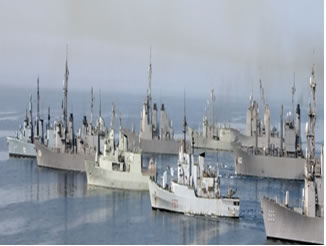fiogf49gjkf0d
by Muuse Yuusuf
 |
|
Warships from Nato in Somali waters |
The gathering of warships from 10 NATO and 7 other countries off the coast of Somalia reminds me of naval military exercises that NATO and WARSAW alliances used to conduct in high seas during the height of cold war as a show off of their military superiority. Also, the event seems to have all marks and resemblance of a military showdown between two superpowers in a world war scenario. This is the feeling of an objective observer like a friend of mine who, when Somali pirates hijacked the Ukrainian ship full of a military hardware, could not resist but to ask me this question: “Has Somalia become a great superpower?!!” I diplomatically dodged to answer the question because the answer was too obvious.
My friend asked me this question because he was obviously overwhelmed by the magnitude of the problem: the abduction of a Ukrainian cargo ship carrying 33 Soviet-made T-72 tanks and MV Sirius Star, the Saudi oil tanker, carrying 2,000,000 barrel of crude oil, weapons and resources that could dictate the outcome of an armed conflict between two states. He was also shocked by the international community’s response, which seems inappropriate, out of proportion and jingoistic.
My friend could not believe of what he was seeing: ragtag pirates taking on and facing great naval powers. He must have thought or imagined that we Somalis have become superpowers overnight and were acting like one. Otherwise what is the showdown for? Why can’t international community use alternative means of force, soft-power, diplomacy and negotiation etc?
At present there are two debates around the piracy issue. The first one is the mainstream in which the media portrays it as a pure criminality in high seas, something that is against international laws, and therefore ought to be brought under control. In this debate emphasis has been put on the piracy and pirates while a lip service is being paid to reasons behind the piracy. In this deliberation, pirates are romanticised or demonised according to reporters’ line of investigation hence “Somali piracy threaten international commerce”, “Piracy money fuels boom towns” “Beautiful Somali girls date pirates”, are not far away from making news headlines. The media seems to follow the official line, that is a call for decisive action in order to safeguard one of the most valued sea routes in the world, in particular at a time when the credit crunch is about to take world economy into a recession, and when commodity prices are sky rocketing.
I cannot help but to think that because of this unbalanced reporting, young minds and those who are not well-versed in the history of piracy would probably perceive all Somalis as pirates. And an isolated Somali pupil in a Western primary school would probably be the latest victim of a bullying because of being identified as a “Somali pirate.” I am sure some Somali refugee children in the West must have suffered because of negative attitudes towards refugees when the media was demonising refugees in the west.
Piracy existed as long as people have used oceans as trade routes, and in any case well before the Somali race appeared in the Horn of Africa.
 |
|
Picture: European and Somali pirate |
From ancient times around 13th century BC when the Sea Peoples, the first documented piracy incidence, threatened the Aegean and Mediterranean to the 1st BC when piracy state pirates along the Anatolian coast endangered the commerce to Roman Empire. Even Julius Caesar was once a victim of piracy, and was only released when a huge amount of gold was paid as a ransom although he later on raised an army, captured pirates and then put them to death.
From the Middle Ages to 19th century high seas were not immune from piracy and arguable almost all human races have all taken their part in the piracy. You only need to mention few examples of piracy incidences to demonstrate the extent and enormity of the problem starting from the Vikings, the European medieval pirates to Muslim and Arab pirates who in 846 raided and sacked Rome and damaged the Vatican; from Cossacks and Uskoks in Eastern Europe to Barbary pirates in North Africa; from Indian, Chinese and Japanese pirates in East and South Asia, and of course the Caribbean piracy, the classic era of piracy, which extends from around 1560 up until the mid 1720s in which European citizens played an active role.
The second debate evolves around the background or reasons behind the piracy. This debate tries to make sense of what ordinary Somali citizens, including fishing communities, maritime experts, environmentalists, and the pirates themselves have all along been trying to tell the world: illegal fishing and waste-dumping that have been taking place in Somali waters in the last 15 years or so. And anyone who tries to report on this unreported side of the story risks being labelled as a mad and out touch journalist, who ought to be crucified.
If today the media is obsessed with reporting of pirates and strong presence of naval force, the media was - throughout the years - very much quite about the well organised illegal fishing that has been taking place in Somalis since the collapse of the central government.
According to UN reports, 700 fishing boats coming from over 10 countries and from far places as Thailand and Japan have been congregating at the Somalia’s beautiful ocean waters, causing environmental havoc and over-fishing. Fishermen have been complaining about these fleets which have been harassing and intimidating the fishing community as early 1990s. Here is how a fisherman described the plight they were facing; "They are not only taking and robbing us of our fish, but they are also trying to stop us from fishing," said Jeylani Shaykh Abdi. "They have rammed our boats and cut our nets." "[Our] existence depends on the fish," He said. Talking about the increase in numbers, he said "It is now normal to see them on a daily basis, a few miles off our shores." Hussein accused the international community of "talking only about the piracy problem in Somalia, but not about the destruction of our coast and our lives by these foreign ships."
It is worth mentioning that Jeylani is not from Northeast of Somalia where most of the piracy has been taking place but is from lower Shabelle region, and indeed from a community well known for its hard work, honesty and love of justice and peace. This is to make the point that some fishermen had to defend themselves, their waters, and their livelihood. A thieving boat must be punished. A lawful action.
UN reports indicate some marine species have been disappearing from Somali waters probably due to over-fishing and exploitation. It is very questionable whether Somali fishermen could have caused such damage because the fishing community is a very small compared to other sectors: it roughly employs about 90,000 (1990), and its numbers have been declining due to displacement. The community also uses rudimentary fishing tools, boats and infrastructure, and therefore does not have the well-organised and mechanised fishing fleet that one needs in order to drive some species to the point of extinction. Even if one takes into account the organised fishing activities that took place during the collapsed central government, it is questionable whether they have had such a huge impact on marine resources. This is because the few hundred fishing fleet boats that the regime had procured were out of work in 1970s due to disrepairs and lack of maintenance.
The other issue that the media and the international community have kept quite about is dumping of toxic and industrial waste in Somalia’s waters. Some UN reports suggest that as early as 1990s companies run by Italian Mafia were regularly transporting industrial waste to Somalia for dumping. This organized group is estimated to control about 30 percent of Italy's waste disposal companies, including those that deal with toxic waste. This is what a UN official had to say about this sensitive issue; “Somalia has been used as a dumping ground for hazardous waste starting about the early 1990s and continuing through the civil war there,” he noted. “European companies found it to be very cheap to get rid of waste there, costing as little as $2.50 a ton where disposal costs in Europe are something like $250 a ton. And the waste is many different kinds. There is uranium radioactive waste. There is lead. There is heavy metal like cadmium and mercury. There is industrial waste and there is hospital waste, chemical wastes. You name it," said Mr. Nuttal, a spokes person for the United Nations Environment Programme (UNEP).
Therefore, it is one thing to underline the scourge of piracy, which is something that must be curbed but it is another sinister story when the media tries to demonise Somalis as pirates and ignores the real causes behind it which, among others things include, the collapse of the Somali state that led to Somalia waters becoming vulnerable to exploitation, and then fishermen taking arms to fend for themselves against well organised and mechanised foreign fishing fleets that have been taking advantage of the anarchy in Somalia.
Also, it is one thing to fight piracy in constructive and moderate way, for example by providing capacity building to regional administrations to enable them police the sea, by supporting fishing communities that are still at a development stage, by highlighting the illegal fishing and waste dumping etc. But it is entirely different story when the international community acts disproportionately and in a jingoist way by deploying a massive naval force in to chase poorly armed but well organised militias. For God’s sake the issue does not require such a show of force, it requires a genuine help in ending the civil war in Somalia, which is the missing link.
I cannot help but to see the gathering of warships from NATO and other nations as a congregation of vultures that are determined to get lion’s share from carrion, metaphorically the carrion being the dead Somali body politic in the same way as those 700 foreign fishing boats have been doing to Somali waters since the collapse of the Somali state. I say this because, in recent Somali history, jingoistic and haphazard military operations e.g. Operation Restore Hope and Ethiopia’s military intervention have not helped but have probably prolonged the conflict.
Muuse Yuusuf
[email protected]